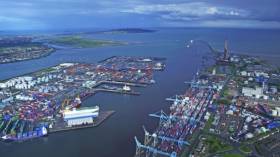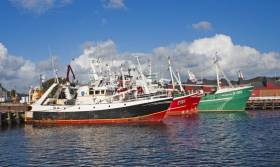Displaying items by tag: Brexit
#ExportersBrexit - Bad news for Irish exporters into the UK as these imports will decline as foreign products become more expensive thanks to the weakening of sterling, ratings agency Fitch has warned.
The Irish Independent writes that a weaker sterling harms the competitiveness of Irish exporters because it cuts margins and makes it more expensive for them to do business in the UK. But it benefits UK domestic businesses.
The pound has weakened considerably since late last year. At the end of November, €1 bought 69 pence. At the close of polls on Thursday, that had weakened to 76 pence, but when the Brexit vote became apparent, it weakened further and is now hovering around the 83 pence mark.
Fitch said the fall in sterling will boost UK exports, but have a negative impact on imports.
"Imports look likely to decline as investment contracts and foreign products become more expensive, resulting in expenditure switching to domestically produced goods and services and higher inflation," the ratings agency has said.
The Irish Exporters Association and other business representative groups has already warned about the impact of currency fluctuations on Irish business.
Simon McKeever, the IEA chief executive, warned further weakening is likely.
And the organisation has called on firms to hedge against this and to talk to the banks.
For much more on this story click here.
#IrishUKTrade - Enterprise Ireland are to seek its clients to be less reliant on the UK markets. The Irish Times writes the reduction will cut the proportion of their exports that go to Britain by about seven percentage points over the next five years, following the UK’s decision to leave the EU.
The agency responsible for helping Irish companies export to international markets, saw exports to the UK increase last year by 12 per cent to €7.5 billion.
The UK remains the Republic’s largest export market, though exports there as a proportion of Enterprise Ireland’s total client exports has declined from 45 per cent in 2005 to 37 per cent in 2015.
Enterprise Ireland UK and northern Europe director Marina Donohoe said on Monday “it would certainly be the intention” to reduce the figure further over the next number of years to mitigate the fallout from the referendum result.
For more on this story, click here.
#Brexit - Britain's exit from the EU could create an opportunity for north Atlantic coastal countries to form their own economic group, according to a leading Irish fishing industry figure.
Speaking to The Irish Times, Irish Fish Producers Organisation (IFPO) CEO Francis O’Donnell said there was sympathy within the industry for Brexit due to the impact of Common Fisheries Policy quotas on their livelihoods.
New markets in South America, Asia and the Middle East could also replace any loss of access to the crucial EU common market, O'Donnell suggested, if Ireland were to "become a global player" and band together with the UK, Iceland and Norway.
Such sentiment within Ireland's fishing communities runs against the current of the majority of Ireland's farming sector, with the IFA urging Irish in the UK to vote to remain in the EU.
The Irish Times has more on the story HERE.

























































